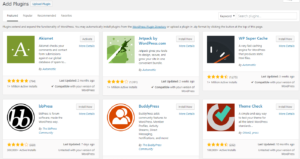If you have a WordPress website, you know how important it is to have a fast and responsive site. Not only do users expect a fast and smooth experience, but search engines also prioritize sites with faster loading times in their ranking algorithms. A slow WordPress site can hurt your search engine rankings, as well as drive away potential customers.
In this article, we will cover some of the most effective ways to speed up your WordPress site and improve its performance. By following these tips and techniques, you can improve the user experience, increase your search engine visibility, and ultimately grow your business.
Choose a fast hosting provider
Your hosting provider plays a crucial role in the speed and performance of your WordPress site. A slow or overloaded server can significantly impact the loading times of your site.

To ensure that your site is fast and reliable, choose a hosting provider that offers high-performance servers, as well as a solid infrastructure and support. Some hosting options, such as managed WordPress hosting, also come with built-in performance optimizations and tools to help you speed up your site.
Optimize your images
Images are often the largest files on a WordPress site, and they can significantly slow down the loading times. To improve the performance of your site, it is essential to optimize your images for the web.

There are several ways to optimize your images for WordPress:
- Resize large images: If you have large images that are larger than the dimensions you need for your site, resize them to the appropriate size. This can significantly reduce the file size of your images.
- Compress images: Use image compression tools, such as Kraken.io or TinyPNG, to reduce the file size of your images without losing quality.
- Use lazy loading: Lazy loading is a technique that delays the loading of images until they are needed, which can improve the performance of your site. There are several WordPress plugins, such as Lazy Load, that can help you implement lazy loading on your site.
Use a caching plugin
Caching is a technique that stores static versions of your site’s pages and posts in the cache, so they can be served faster to users. By using a caching plugin, you can significantly improve the loading times of your WordPress site.

Some popular caching plugins for WordPress include WP Super Cache, W3 Total Cache, and Cache Enabler. These plugins can help you create and manage a cache for your site, as well as optimize the performance of your site’s database and server.
Minimize the use of plugins
While WordPress plugins can be useful for adding functionality to your site, they can also slow down your site if not used carefully. Each plugin you install on your site can add additional code and resources that need to be loaded, which can impact the performance of your site.

To minimize the impact of plugins on your site’s performance, only install the plugins you really need, and regularly review and remove any unnecessary or unused plugins. You can also consider using lightweight alternatives to popular plugins, such as Cloudflare or Autoptimize, which can offer similar functionality without the added bloat.
Optimize your database
Over time, your WordPress site’s database can become cluttered with unnecessary data, such as old revisions, trashed posts, and spam comments. This can slow down your site and impact its performance.

To optimize your WordPress database, you can use a plugin such as WP-Optimize or Advanced Database
Conclusion
In conclusion, there are several effective ways to speed up your WordPress site and improve its performance. By choosing a fast hosting provider, optimizing your images, using a caching plugin, minimizing the use of plugins, and optimizing your database, you can significantly improve the loading times and user experience of your site.
In addition to these tips, there are many other techniques and tools you can use to speed up your WordPress site, such as using a content delivery network (CDN), optimizing your website’s code, and leveraging browser caching.
By following these tips and staying up-to-date with the latest performance optimization techniques, you can ensure that your WordPress site is fast and responsive, which can help you attract and retain more visitors, improve your search engine rankings, and ultimately grow your business.


